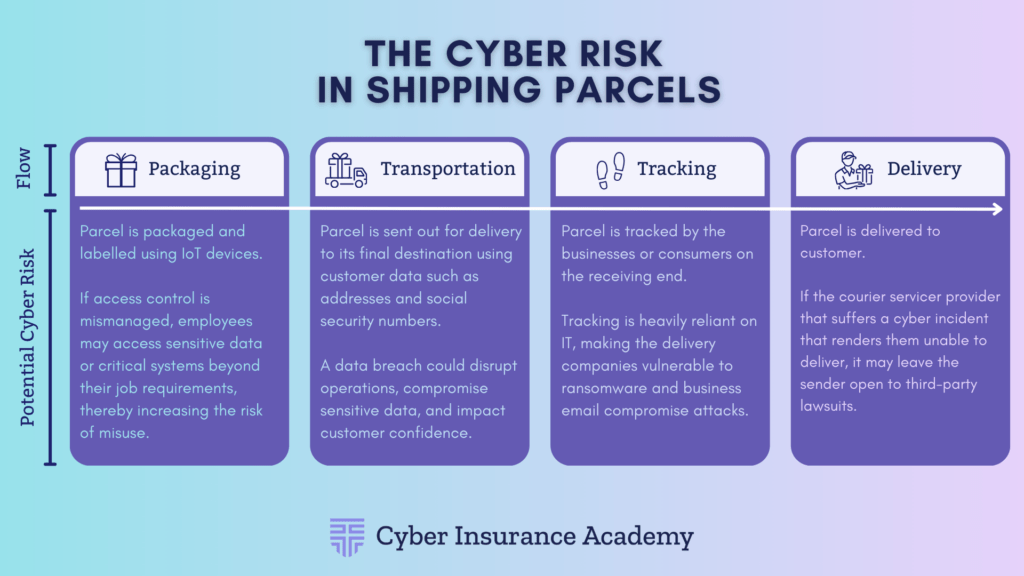As part of his Certified Cyber Insurance Specialist (CCIS) training, Parmijt (PJ) Bansel completed a complex industry analysis on the cyber risk in the parcel delivery industry. This industry has seen significant growth over the past two decades due to the rise of e-commerce and the recent Covid-19 pandemic. As people increasingly turned to online shopping, companies like Amazon expanded their offerings to virtually any product, including those sold by third-party businesses. The pandemic further boosted this trend as lockdown restrictions led to a surge in online purchases. In the 2020-21 fiscal year, the UK’s domestic parcel delivery revenue reached nearly 9.4 billion GBP.
Underlying causes of Cyber Risk in the Parcel Delivery Industry
The adoption of various technologies introduces new cyber risk dimensions to the parcel delivery industry. Management systems, parcel tracking apps, handheld devices, and enterprise wearables are designed to increase productivity, but they also present potential vulnerabilities. The utilization of IoT devices, for instance, offers improved efficiency but also brings significant security challenges. Additionally, due to the high employee turnover rate, disgruntled former employees, may exploit their inside knowledge and access to disrupt operations or leak sensitive information. Human errors, such as falling for phishing attacks or mishandling data, can lead to security incidents. Insufficient cybersecurity training can result in employees inadvertently engaging in risky behavior or failing to identify threats. Furthermore, a lack of robust access control measures can allow employees to access sensitive data or critical systems beyond their job requirements, thereby increasing the risk of misuse.
Sensitive Data and PII
Within the UK’s parcel delivery industry, the handling of sensitive data and Personally Identifiable Information (PII) is of great concern, especially given its immense value on the dark web. These companies rely heavily on IT for tracking and delivering goods, making them vulnerable to ransomware attacks and Business Email Compromise. The industry routinely collects significant customer data such as addresses and social security numbers, making the safeguarding of this data and compliance with the Information Commissioner’s Office (ICO), vital.
Parcel Delivery Companies must ensure compliance with regulatory bodies to avoid severe penalties for data breaches. A data breach could disrupt operations, compromise sensitive data, and impact customer confidence, underscoring the need for proactive cybersecurity practices. The implementation of data protection measures, including encryption, stringent access controls, and regular security audits, become not only necessary but integral. These mechanisms serve to thwart data theft and safeguard the entity’s reputation, thereby preventing potential regulatory issues.
Third-Party Claims and Litigation in the U.S Parcel Delivery Industry
The risk of third-party claims and litigation is particularly high in the U.S. parcel delivery industry due to the potential for Business Interruption (BI) from a cyberattack. Businesses that rely on parcel delivery services for their operations could potentially be stunted by an attack on their courier service provider. As a result, these businesses may launch class-action lawsuits against the disrupted delivery company, significantly amplifying the cost and impact of the cyberattack. Therefore, parcel delivery services must invest in strong cybersecurity measures to protect not only themselves but their dependent businesses from the ripple effect of an attack.
In conclusion, the parcel delivery industry faces escalating cyber risks that demand immediate attention. To protect sensitive data and ensure operational integrity, companies must prioritize cybersecurity measures such as technological solutions, comprehensive employee training, and regular security audits. By taking proactive steps now, the industry can safeguard customer trust, prevent data breaches, and maintain reliable parcel delivery services.








